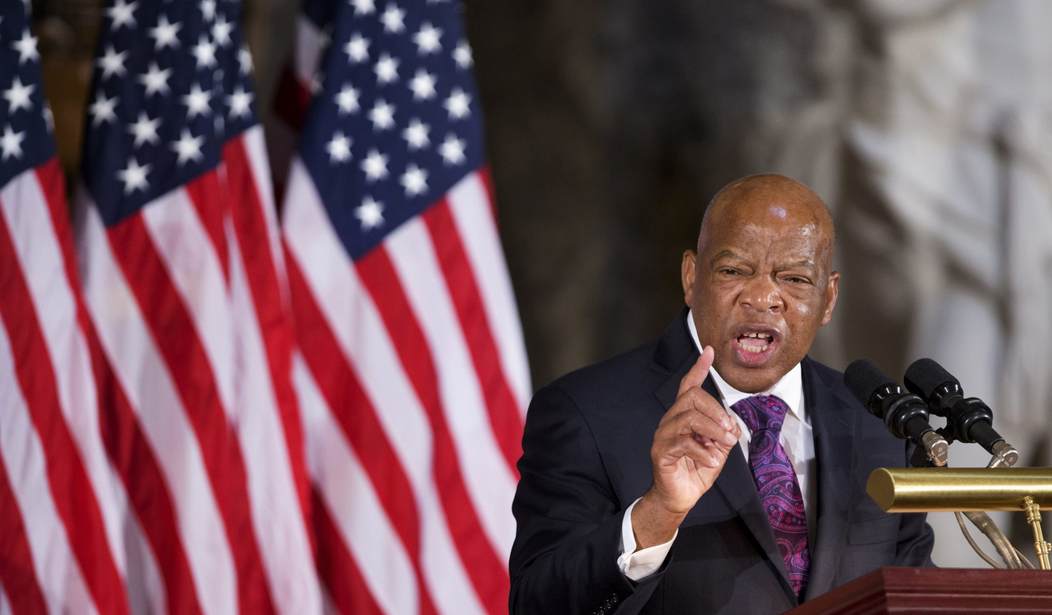Earlier this month, Rep. John Lewis (D-Ga.) filed H.R. 4169, the “Religious Freedom Peace Tax Fund Act.” The bill would allow taxpayers “who are conscientiously opposed to participation in war” to send their tax dollars to a separate fund that would spend the revenue on non-military purposes. Yet the same Democrat also opposes the Hyde Amendment, which prevents taxpayers from being forced to fund abortion.
In other words, he wants religious freedom for taxpayers if they disagree with funding the U.S. military, but not if they disagree with funding the killing of an unborn baby in the womb. How does that compute?
H.R. 4169 aims “to affirm the religious freedom of taxpayers who are conscientiously opposed to participation in war, to provide that the income, estate, or gift tax payments of such taxpayers be used for nonmilitary purposes, to create the Religious Freedom Peace Tax Fund to receive such tax payments, to improve revenue collection, and for other purposes.”
The bill argues that “conscientious objectors” have long “sought alternative service for their tax payments. … They request legal relief from government seizure of their homes, livestock, automobiles, and other property; and from having bank accounts attached, wages garnished, fines imposed, and imprisonment threatened, to compel them to violate their personal and religious convictions.”
“Conscientious objection to participation in war in any form based upon moral, ethical, or religious beliefs is recognized in Federal law, with provision for alternative service; but no such provision exists for taxpayers who are conscientious objectors and who are compelled to participate in war through the payment of taxes to support military activities,” the bill continues.
Yet at the same time, one of the key functions of government is to “provide for the common defense.” Taxes must fund some military purposes, but religious objectors perhaps should be able to only fund military purposes of a defensive nature. Some conscience protection is certainly defensible.
H.R. 4169 seems overbroad for this purpose, and it could effectively defund the U.S. military. For purposes of the act, “the term ‘military purpose’ means any activity or program which any agency of the Government conducts, administers, or sponsors and which effects an augmentation of military forces or of defensive and offensive intelligence activities, or enhances the capability of any person or nation to wage war.”
This would include any funds for the Department of Defense, the intelligence community, the Selective Service System (the draft), any Department of Energy activities with a military purpose, NASA activities with a military purpose, military foreign aid, and “the training, supplying, or maintaining of military personnel, or the manufacture, construction, maintenance, or development of military weapons, installations, or strategies.”
What an exemption!
It seems more than a little ironic that John Lewis, well respected for his role in the Civil Rights movement, would so vehemently defend the religious freedom of conscientious objectors to the military while attacking the religious freedom of conscientious objectors to abortion.
In December 2016, he joined 106 other Democrats in urging President Donald Trump to repeal the Hyde Amendment, which protects taxpayers from being forced to fund abortion, which the Democrats equated with health care.
Many Americans would disagree. Nearly half of Americans believe life begins at conception, and 62 percent believe life begins at conception or within the first three months of pregnancy. Most Americans believe biologists should determine when life begins, and most biologists believe life begins at conception. While more Americans identify as pro-choice than pro-life in many studies, a whopping 80 percent said they think abortion should be limited to the first three months of pregnancy. A majority of Americans (54 percent) support the Hyde Amendment.
Last year, the Supreme Court ruled that workers could not be forced to contribute funds to a union that used that money to promote political causes the workers disagree with. Applying this principle to taxes would be extremely complicated.
I would welcome an option for taxpayers to opt out of funding certain parts of the government they disagree with, but such a system would likely be unworkable. If conscientious objectors could opt out of funding the military, could fiscal conservatives opt out of sending their taxpayer dollars to prop up welfare programs? Indeed, if H.R. 4169 were to become law, many liberals who want to shrink the size of the military will likely start claiming religious exemptions, whether they are truly conscientious objectors or not.
In a representative democracy, voters already have the opportunity to effect change in the government — by choosing representatives who can make substantive changes in the law. Voters support the Hyde Amendment, and it is the law — despite the Democrats’ recent attacks against it.
H.R. 4169 seems unlikely to pass. Not a single representative has joined John Lewis as a co-sponsor. Lewis’s office did not respond to PJ Media’s request for comment by press time.
Follow Tyler O’Neil, the author of this article, on Twitter at @Tyler2ONeil.









Join the conversation as a VIP Member